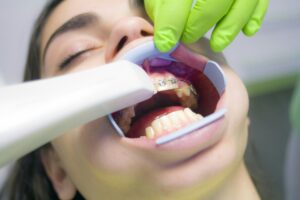Braces speech changes are common, especially in the first few weeks of treatment. Many people notice a slight lisp or difficulty pronouncing certain words after getting braces. This happens because the tongue, lips, and teeth need time to adjust to the new hardware.
While these changes can be frustrating at first, most are temporary. With practice and small adjustments, speech usually returns to normal. Some people even experience long-term improvements in pronunciation after braces correct their bite. Understanding what to expect and how to adapt can make the process easier.
How Braces Affect Speech

Braces slightly alter the way the tongue and lips move against the teeth. This shift can impact speech, especially for sounds that rely on tongue placement, such as “s” and “th.”
Why Speech Feels Different at First
- The brackets and wires create small physical barriers inside the mouth.
- The tongue may need to reposition itself to produce certain sounds.
- Increased saliva production can make it harder to pronounce words clearly.
Common Speech Changes with Braces
- Temporary Lisp: The most noticeable difference is a mild lisp, which fades as the tongue adjusts.
- Slower Speech: Some people slow down naturally while adjusting to speaking with braces.
- Whistling Sounds: This can happen when air passes through gaps between the braces and teeth.
The brain and mouth work together to adapt, usually within a few weeks. Practicing speech exercises and being mindful of pronunciation can help speed up the process.
Common Speech Challenges with Braces
Speech changes with braces are temporary, but they can be noticeable. Some people experience only minor differences, while others may find certain words harder to pronounce. These challenges are most common in the early stages and typically improve over time.
1. Lisp or Whistling Sounds
- A slight lisp happens when the tongue struggles to form sounds against the brackets and wires.
- Whistling may occur when air escapes through small gaps between the braces and teeth.
- These effects usually fade as the tongue and lips adjust.
2. Difficulty Pronouncing Certain Sounds
- “S,” “Z,” “Th,” and “Sh” sounds require precise tongue placement, which braces can disrupt.
- Words that contain these sounds might feel harder to say clearly at first.
- Slow, deliberate speech can help improve pronunciation.
3. Increased Saliva Production
- Braces can cause the mouth to produce more saliva than usual.
- This may make speech feel different or lead to occasional slurring.
- Drinking water and pausing between words can help manage this issue.
Most speech adjustments happen naturally as the mouth gets used to braces. Practicing pronunciation and being patient with the process can make speaking feel normal again sooner.
How Long Do Speech Issues Last?
Speech changes caused by braces don’t last forever. Most people adjust within a few weeks, but the exact timeline depends on individual factors like tongue placement, bite alignment, and how often they practice speaking.
1. The Initial Adjustment Period
- The first few days are when speech differences are most noticeable.
- The tongue, lips, and cheeks need time to get used to the new positioning.
- Lisping, minor speech delays, or slight discomfort while talking may occur.
2. Gradual Improvement Over Time
- After the first week, the tongue starts to adapt, reducing speech difficulties.
- By the second or third week, most people feel more comfortable speaking normally.
- The more someone speaks, the faster their mouth adjusts.
3. Factors That Can Extend the Adjustment Period
- Braces Tightening: Adjustments can temporarily affect speech, but the impact is usually minimal.
- New Attachments: If additional brackets, rubber bands, or appliances are added, it may take a few days to adapt.
- Pre-existing Speech Issues: If a person already had minor speech difficulties, braces may highlight them at first.
Practicing speech exercises, reading out loud, and focusing on pronunciation can speed up the adjustment process. With time, speaking with braces feels just as natural as it did before treatment.
Tips to Improve Braces Speech Adjustment
Adjusting to speech changes with braces takes practice, but there are simple ways to make the transition easier. The more someone speaks, the faster their mouth adapts. Using targeted exercises and techniques can help speed up the process.
1. Practice Techniques for Clearer Speech
- Read Out Loud Daily – Reading books, articles, or even social media posts aloud helps train the tongue and lips to work around braces.
- Repeat Difficult Words – Identifying words that feel challenging and practicing them slowly can improve pronunciation.
- Use a Mirror – Watching mouth movements while speaking can help correct minor speech issues.
2. Speech Exercises for Faster Adjustment
- Tongue Twisters – Phrases like “She sells seashells by the seashore” strengthen tongue control and pronunciation.
- Slow and Clear Speech – Speaking slower allows better tongue placement and reduces lisps.
- Over-Enunciate Sounds – Exaggerating movements while pronouncing “S” and “Th” sounds helps the tongue adjust.
3. Stay Hydrated and Be Patient
- Drink Water Regularly – This reduces excess saliva and prevents slurred speech.
- Take Breaks When Speaking for Long Periods – If speech feels tiring, short pauses can help maintain clarity.
- Give It Time – Most speech issues improve naturally as the tongue and mouth adjust.
4. When to Consider Professional Help
- If speech difficulties persist after several weeks, a speech therapist can provide targeted exercises.
- An orthodontist can also check if adjustments to the braces might help.
With consistent practice, braces speech changes fade over time. Daily speech habits and patience make a big difference in getting back to normal pronunciation.
Do Braces Have Long-Term Effects on Speech?
Braces may temporarily affect speech, but in the long run, they often lead to clearer pronunciation. Once the mouth fully adjusts and the braces are removed, speech typically returns to normal—or even improves.
1. Speech Returns to Normal After Braces
- Once the brackets and wires are removed, there are no longer obstacles affecting tongue and lip movement.
- Any minor speech changes caused by braces disappear within days or weeks after treatment ends.
- The tongue reverts to its natural placement without interference.
2. How Braces Can Improve Speech in the Long Run
- Corrected Alignment: Misaligned teeth or bite issues can cause speech difficulties, such as a lisp or trouble pronouncing certain sounds. Braces help correct these problems.
- Better Tongue Placement: A properly aligned bite gives the tongue more space to form words correctly.
- Reduced Airflow Issues: Closing gaps and correcting overbites or underbites can eliminate whistling sounds when speaking.
3. When to Follow Up with an Orthodontist
- If speech difficulties remain after braces are removed, an orthodontist can check for lingering bite issues.
- In rare cases, a speech therapist may help refine pronunciation if speech challenges were present before braces.
Braces may cause short-term speech adjustments, but they often lead to long-term benefits. Many people find that speech clarity improves after orthodontic treatment is complete.
Braces Speech FAQs
Many people have questions about how braces affect speech and how long any changes might last. Here are some of the most common concerns.
1. Will my speech return to normal after getting braces?
Yes. Most speech changes are temporary, and the tongue adapts within a few weeks. Once the braces are removed, speech returns to normal, and in some cases, it improves due to better teeth alignment.
2. Can Invisalign cause the same speech issues?
Invisalign aligners can also cause minor speech changes, especially a slight lisp in the beginning. Since the aligners are smooth and removable, most people adjust quickly. Speech difficulties with Invisalign are usually less noticeable than with traditional braces.
3. How can I adjust faster to speaking with braces?
- Read out loud daily.
- Practice tongue twisters to improve pronunciation.
- Speak slowly and clearly to give the tongue time to adjust.
- Stay hydrated to reduce excess saliva.
- If needed, consult an orthodontist for additional tips.
4. Do rubber bands or other orthodontic appliances affect speech?
Yes, rubber bands, expanders, and other appliances can temporarily make certain words harder to pronounce. As the mouth adjusts, these issues usually fade. Speaking more frequently helps speed up the process.
5. What if my speech still feels off after my braces are removed?
Most people adjust back to normal speech quickly after braces come off. If speech issues persist, an orthodontist can check for any lingering bite or alignment concerns. A speech therapist can also help if necessary.
Speech changes with braces are normal, but they don’t last forever. With time and practice, most people regain full clarity in their pronunciation.
Conclusion
Braces speech changes are temporary and improve as the mouth adapts. A slight lisp, whistling sounds, or difficulty pronouncing certain words may happen at first, but most people adjust within a few weeks. Practicing speech exercises, speaking regularly, and staying patient can help speed up the process.
In the long run, braces often lead to better speech clarity by correcting bite and alignment issues. Once the braces are removed, any speech difficulties typically disappear. If concerns persist, an orthodontist or speech therapist can offer guidance.
Braces are a short-term adjustment for a long-term benefit. Speech changes may be part of the process, but they are just a step toward a healthier and more aligned smile.
Expert Orthodontic Care for a Confident Smile
Speech adjustments with braces are temporary, but expert guidance makes the process smoother. At Carroll Orthodontics, we understand every smile is unique, and we’re here to help you feel comfortable and confident throughout your treatment.
Dr. Marshall Carroll is a leader in orthodontic care, known for his expertise in Invisalign and braces for all ages. Our team provides personalized treatment using advanced techniques to ensure the best results. No referral is needed to schedule an evaluation, and we offer complimentary early orthodontic assessments for children as young as seven.
If you’re considering braces or want expert advice on orthodontic care, contact Carroll Orthodontics today. Let’s discuss the best path to a healthier, more confident smile.

